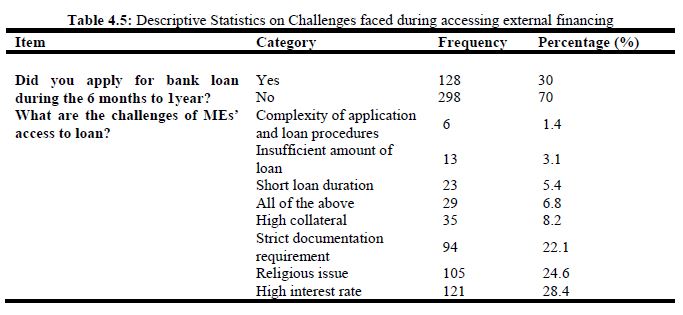Financing Constraints of Microenterprises (MES) in North-Eastern Nigeria: The Prospect of Islamic Microfinance
DOI:
https://doi.org/10.5281/zenodo.10986400Keywords:
financing constraint, microenterprises, islamic microfinance, north-eastern nigeriaAbstract
Micro Enterprises (MEs) occupy a central place in the economies of both developed and developing nations. Micro Enterprises are business with fewer than ten (10) employees. These enterprises have fundamental roles in the development of any economy. In addition, they make-up the vast majority of enterprises (between 70% and 95%) around the globe. Despite the importance and contributions of MEs to the economic growth of Nigeria, many constraints affects their development and the most formidable of these constraints is the lack of access to finance. However, the emergence of Islamic microfinance in the Nigeria is a positive innovation in the economy. Adoption of Islamic microfinance would significantly address the financing constraints faced by micro enterprises in the region. It is against this background that this study examined the financing constraints faced by micro enterprises in the north-eastern region and assess how Islamic microfinance can improve MEs access to finance. A structured questionnaire was used to collect data from microenterprises in two (2) states of the north-east region, namely, Gombe and Yobe states, respectively. Multiple sampling techniques were used to identify respondents in six (6) local government areas (3 from each state), including, Gombe, Akko, Funekaye, Potiskum, Bade and Damaturu LGAs. Out of the 440 copies of questionnaires administered, 426 were usable. The results of descriptive analysis revealed that microenterprises may eventually succeed in accessing external financing, but they might encounter difficulties in the process of obtaining these loans. The challenges MEs often face in accessing external funds include: religious prohibition, high interest rate, strict documentation requirement, high collateral, short loan duration, insufficient amount of loan, and complexity of loan application and procedure. The result also showed that Islamic Microfinance have high prospect in enhancing ME access to finance and majority of ME owners are willing to patronize the Islamic microfinance if offered.
Downloads
References
Abdesamed, K .H., & Abd Wahab, K. (2014). Financing small and medium scale enterprises (SMEs): Determinants of bank loan application. African Journal of Business Management, 8(17), 717 - 727. doi:10.5897/AJBM 2013.7222.
Abdullahi, M. S., Aminu, A., Rahama, L. A., Kamalu, U., Murtala, B. U., Ibrahim, T. S., Farouk, U. K., …. & Lawan, S. A. (2015). The nature of small and medium scale enterprises (SMEs): Government and financial institutions support in Nigeria. International Journal of Academic Research in Business and Social Sciences, 5(3), 2222-6990.
Abdulsaleh, A. M., & Worthington, A. C. (2013). Small and medium-sized enterprises financing: A review of literature. International Journal of Business and Management, 8(14), 36-54. Retrieved from http://dx.doi.org/10.5539/ijbm.v8n14p36.
Abor, J., & Biekpe, N. (2006). Small business financing initiatives in Ghana. Problems and Perspectives in Management, 4(3), 69-77.
Ahmed, H. (2002). Financing microenterprises: An analytical study of Islamic microfinance institutions. Islamic Economic Studies, 9(2), 27-64.
Aleiro, I. H., &Yusuf, M. M. (2017). Analysis of constraints to credit access for SMEs in Sokoto metropolis. Asian Journal of Economic Modelling. 5(2), 167-174. doi:10.18488/journal.8.2017.52.167.174. Retrieved from: www.aessweb.com.
Bahago, F. J. (2015). Contribution of small and medium enterprises development agency of Nigeria (SMEDAN) to the growth and development of micro, small and medium enterprises in Kaduna and Kano States (Ph.D Thesis). Ahmadu Bello University, Zaria - Nigeria.
Basil, A. N. O. (2005). Small and medium enterprises (SMEs) in Nigeria: problems and prospects (Ph.D. Thesis). St. Clements University.
Bazza, M. I., Maiwada, B. Y., & Daneji, B. A. (2014). Islamic financing: a panacea to small and medium scale enterprises financing problems in Nigeria. European Scientific Journal, 10(10), 1857–7881.
Beck, T. (2007). Financing constraints of SMEs in developing countries: Evidence, determinants and solutions.
EFInA. (2012). Promoting access to credit for MSMEs through effective government interventions. Enhancing Financial Innovation & Access (EFInA).
Etuk, R. U., Etuk, G. R., & Baghebo, M. (2014). Small and medium scale enterprises (SMEs) and Nigeria’s economic development. Mediterranean Journal of Social Sciences (MCSER), 5(7), Rome - Italy.
Freeman, N. (2015). Financing small and medium sized enterprises for sustainable development: A view from the Asia-Pacific region. MPDD Working Paper WP/15/05. Retrieved from www.unescap.org/our-work/macroeconomic-policy-development/financing-development.
Ghandi, E. C., & Amissah, G. (2014). Financing options for small and medium enterprises (SMEs) in Nigeria. European Scientific Journal, 10(1), 1857–7881.
IFC - Egypt Report. (2014). Islamic banking opportunities across small and medium enterprises. IFC.
KPMG. (2014). Strengthening access to finance for micro, small and medium enterprises (MSMEs) in Nigeria. Nigeria: KPMG.
National Policy on MSMEs. (2015). Draft national policy on micro, small and medium enterprises. Federal Republic of Nigeria. SMEDAN.
OECD. (2004). 2nd OECD ministerial conference on SMEs, 3-5 June. Istanbul, Turkey.
OECD. (2017). Enhancing the contributions of SMEs in a global and digitalize economy. Paris: OECD.
Saidu, H. (2014). Financing small and medium enterprises (SMEs) in Gombe Metropolis: A study of rice processing mills. International Journal of Social Sciences and Entrepreneurship, 1(12), 591-603.
Small and Medium Enterprises Development Agency of Nigerian (SMEDAN) and National Bureau of Statistics (NBS) (2017). SMEDAN and national bureau of statistics (NBS) collaborative survey: Selected findings. Nigeria: SMEDAN.
Taiwo, J.N., Falohun, T. O., & Agwu M. E. (2016). SMEs financing and its effects on Nigerian economic growth. European Journal of Business, Economics and Accountancy, 4(4).
Tom, E. E., Glory, B., & Alfred U. J. (2016). An appraisal of Nigeria’s micro, small and medium enterprises (MSMEs): Growth, challenges and prospects. International Journal of Small Business and Entrepreneurship Research, 4(4), 1-15.
Usman, Y. A, & Abdallah, T. Z. (2014) SMEs financial constraints in Nigeria and Islamic finance option: The case for Kaduna State. European Journal of Business Management, 2(1), 161-173.
Waked, B. (2016). Access to finance by Saudi SMEs: Constraints and the impact on their performance (Ph.D. Thesis). Victoria University, Australia.
Wangmo, C. (2016). Small and medium enterprise (SME) financing constraints in developing countries: A case study of Bhutan (Ph.D. Thesis). Victoria University, Melbourne, Australia.

Downloads
Published
How to Cite
Issue
Section
License
Copyright (c) 2024 Dr. Usman Bukar Muhammed, Ibrahim Muhammad Baba, Aminu Dawood Mika’el, Lukman Lawan Muhammad

This work is licensed under a Creative Commons Attribution 4.0 International License.
Research Articles in 'Management Journal for Advanced Research' are Open Access articles published under the Creative Commons CC BY License Creative Commons Attribution 4.0 International License http://creativecommons.org/licenses/by/4.0/. This license allows you to share – copy and redistribute the material in any medium or format. Adapt – remix, transform, and build upon the material for any purpose, even commercially.









